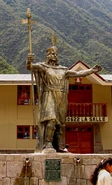![]() Back to Leaders (Civ6)
Back to Leaders (Civ6)
"Wiracocha, shine on the Inca people, illuminate your servants whom you have sheparded."
Pachacuti (1410 AD – 1471 or 1472 AD) was the ninth Sapa Inca of the Kingdom of Cusco, which he transformed into the Inca Empire. He leads the Incas in Civilization VI: Gathering Storm.
Intro
Pachacuti, son of the Sun, father to a prosperous people who dwell among lofty peaks. Let the mountains be roads to you, and mighty walls for your enemies, for you grow in strength where others would starve. O, Sapa Inca who shakes the earth, show strength and diligence, and your name will shine throughout all of history.
In-Game
Pachacuti's unique agenda is Sapa Inca. He will try to settle near Mountains whenever possible and dislikes other leaders who settle near Mountains.
His leader ability is Qhapaq Ñan. His domestic ![]() Trade Route Trade Routes provide +1
Trade Route Trade Routes provide +1 ![]() Food for every Mountain tile in the origin city's territory, and his Builders can build the Qhapaq Ñan when he discovers Foreign Trade.
Food for every Mountain tile in the origin city's territory, and his Builders can build the Qhapaq Ñan when he discovers Foreign Trade.
Detailed Approach
Lines
Voiced
Agenda-based Approval: ?
Agenda-based Disapproval: The Inca are masters of the mountains. Do not challenge me on this ground. Be content with the lowlands.
Attacked: Now is the time for war. Hear the stamp of our warriors - warriors with the hearts of the puma.
Declares War: Let there be war between us! I will wrestle your lands away, and rule your subjects with strength. (Kunanqa maqanakuy pacham kachkan, sinchikunap saruyninta uyariy! Puma sunquyuq sinchikunam!)
Defeated: How did you darken the sun? I ruled with diligency and mercy - see that you do so as well.
Greeting: You stand before Pachacuti Inca Yupanqui. I accept your greeting and the service you can provide the Inca.
Unvoiced
An honor to meet you: Come and witness the Inca have done under my guidance.
Delegation: Receive these gifts of alpaca wool and turquoise. I am also sending you some cuy—eat it while it's hot.
Denounced:
Denunciation: Your authority is empty, your lands contemptible, your people dissolute. your day of destruction comes soon.
Declaration of Friendship: We are as the sun and moon, giving light to the world. Shall we declare our friendship?
Civilopedia entry
Pachacuti brought the Inca from relative obscurity in their city-state of Cusco to become one of the most organized, powerful, and industrious civilizations of the Americas. Under his reign, the Inca began the process of conquest and diplomatic consolidation that would serve to bring their empire to its height. Most Inca records were oral, and there was a significant loss of cultural history with the disintegration and collapse of the Inca Empire in the 16th Century. Consequently, we have relatively few details on the remarkable life of Pachacuti.
By tradition, he is numbered the ninth ruler of Cusco. Born Cusi Yupanqi, a younger son of Inca Viracocha, he was not in line to inherit the throne. At one point, the neighboring Chanka tribe invaded Cusco, and Viracocha and his chosen heir fled, while Cusi Yupanqi remained behind to organize the successful defense of Cusco. The legend is that “the very stones rose up to defend Cusco,” leading to Pachacuti's new name, which means “earth-shaker” in Quechua.
This victory had the salutary effect of raising his esteem in the eyes of the population and securing himself the chieftaincy upon Viracocha's death. Pachacuti immediately embarked on a campaign of expansion and conquest. Potential subjects were offered an opportunity to incorporate peacefully into the empire, and enjoy the benefits of social organization and material riches. If they accepted, their rulers were brought to Cusco and instructed in Inca governance, or married into Pachacuti's family. If they rejected the overtures, they were subdued militarily.
During Pachacuti's reign, Cusco was expanded as a royal capital befitting an emperor. The Incan religion, centered on the sun god, Inti, was expanded, and the role of the priesthood was further codified within the Empire. Pachacuti himself is credited with composing a number of hymns to the Inca pantheon, which were later recorded by Spanish writers during the colonial period. He may also have established the Inti Raymi holiday, celebrating the start of the new year in the Andes. Pachacuti was a prolific builder. He directed the construction of the massive royal estate at Machu Picchu, as well as irrigation projects, terrace farms, and systems of roads and travelers' hostels.
When Pachacuti died in 1471, power transferred peacefully to his son, Tupac Inca Yupanqi, who had served as either co-regent or battlefield commander during his father's reign. Future Sapa Inca were unable to leave uncontested successions, further burnishing Pachacuti's reputation.
During his lifetime, Pachacuti established the basic pattern of Inca rule: Strong but competent central authority, a highly organized population, and use of the mit'a system of labor in support of public works. But he was also willing to displace large numbers of lower-class people in order to serve his wishes for the empire, and the Inca were willing to engage in war to expand their holdings. Still, he began a remarkable life with no expectation that he would rule, and when he died, the Inca were on the march to become one of the largest civilizations of the New World.
Trivia
- As of the release of Gathering Storm, Pachacuti is one of nine returning leaders from Civilization V and its expansions (along with Dido, Gandhi, Genghis Khan, Montezuma, Pedro II, Alexander, Shaka, and Suleiman).
- Pachacuti's diplomacy screen shows a village and a terrace farm in front of the Andes Mountains.
- Pachacuti's leader ability is named after the Inca road system, while his leader agenda is his title.
- Pachacuti is seen carrying a halberd.



